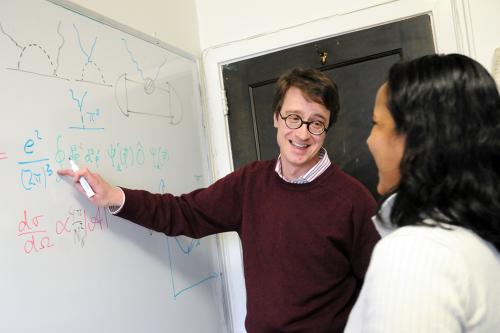PhD in Physics
The PhD in Physics program prepares students for teaching and research-based positions in physics. Working alongside our renowned faculty mentors, PhD students become experts in their field.
Doctoral students delve into a research specialty chosen from the departmental core areas: nuclear physics, biophysics or astrophysics. They join a research lab corresponding to their interests and often work as teaching assistants, research assistants or fellows during their studies.
Application Deadlines
Fall Semester: January 15
Spring Semester: October 1 (Note: Spring admission is not always offered to PhD applicants.)
Course Requirements
Note: Additional elective PHYS courses (such as PHYS 6810 Applied Statistics and Data Analysis in Physics) can be found on the GW Bulletin website.
The following requirements must be fulfilled:
The general requirements stated under Columbian College of Arts and Sciences, Graduate Programs.
The requirements for the Doctor of Philosophy program.
A minimum of 72 credits in graduate coursework, including at least 45 credits in required and selected courses taken at the pre-candidacy stage and at least 6 and at most 27 credits in dissertation. Up to 12 of these credits may be taken in courses offered by the other affiliated members of the Consortium of Universities of the Washington Metropolitan Area. Successful completion of a general examination, satisfactory progress toward the degree (documented in the annual student reports and faculty feedback), and an oral defense of the doctoral thesis are also required.
| Code | Title | Credits |
|---|---|---|
| Required * | ||
| PHYS 6110 | Mathematical Methods of Theoretical Physics | |
| PHYS 6120 | Advanced Mechanics | |
| PHYS 6210 | Electrodynamics and Classical Field Theory | |
| PHYS 6220 | Quantum Mechanics I | |
| PHYS 6310 | Statistical Mechanics | |
| PHYS 6320 | Quantum Mechanics II | |
| PHYS 6130 | Computational Physics I | |
| PHYS 6230 | Computational Physics II | |
| PHYS 6330 | Computational Physics III | |
| Completion of one of the following options: | ||
| Option A | ||
| PHYS 6610 | Nuclear and Particle Physics I | |
| PHYS 6710 | Nuclear and Particle Physics II | |
| Option B | ||
| PHYS 6620 | Biophysics I | |
| PHYS 6720 | Biophysics II | |
| Option C | ||
| PHYS 6630 | Radiative Processes in Astrophysics | |
| PHYS 6730 | High-Energy Astrophysics | |
| Additional course requirements | ||
| 6 additional credits in graduate-level PHYS courses. | ||
| 6 credits in graduate-level courses related to the student's field(s) of study, which may be taken outside the department, subject to the advisor's approval. | ||
*Specific course requirements can be waived on a case-by-case basis upon approval of the department’s graduate advisor.
Research fields
- Nuclear physics—experimental and theoretical studies on the structure, electromagnetic, weak and strong interactions, and scattering of few-body systems at low and intermediate energies;
- Biophysics and condensed-matter physics—experimental, theoretical, and computational studies of structures and functions of cells, biological networks and biomolecules, deciphering information encoded in genome;
- Theoretical and observational astrophysics—high-energy astrophysics, multi-wavelength studies of extreme energy-density environments and huge energy releases in astrophysical objects;
- Interdisciplinary physics, including energy research and physics education research.


